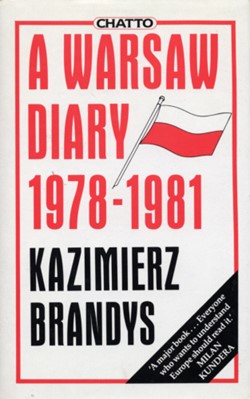A Warsaw Diary 1978-81

A Warsaw Diary 1978-81
Kazimierz Brandys
1984
ISBN 0701129034
London: Chatto & Windus
98 Books about Poland | Polish War Graves in Britain
Karol Wojtyla becomes the first Polish Pope in 1978. Solidarity, a free and independent trade union, is born in the strike at the shipyard in Gdansk in August 1980. Lech Walesa becomes its leader.
On 13 December 1981 General Jaruzelski, Polish Head of State, declares a State of War. Marital law is imposed, Solidarity leaders and activists are interned. Kazimierz Brandys records what it felt like to live through these events in a communist police state.
Kazimierz Brandys in the book writes:
November 1978
Julek S. tells of the anniversary ceremonies at the Tomb of the Unknown Soldier, where thousands of people had come together (the police were out of sight, hidden in side streets). Thousands sang "Oh God, Who So Long Has Protected Poland"
April 1979
On the day Karol Wojtyla's election to the papacy was announced people ran through the streets of Warsaw shouting with joy. A tearful old man [said] "Did you hear? It's a miracle! A miracle!"
November 1981
The government is to introduce into the Sejm the draft of a bill calling for martial law. Solidarity has issued a standby call for a general strike...threats and lies continue to pour from the television...What is hidden behind those dark glasses [of General Jaruzelski] - Poland or Russia?
Reviews
R Z Sheppard, Time (US) 9 January 1984, wrote in To Be or Not To Be.
The nature of his diary precludes dramatic narrative and the delineation of character. One learns obliquely of the "Flying University," a scholarly group of dissidents who meet in various locations; of NOWA, the independent publishing house that challenges the censors; of K.O.R. (Workers Defense Committee) and its support of Solidarity; and of the thaws and sudden freezes that characterize government policy. Brandys' strengths are not those of an eyewitness; much of what he describes is second-and thirdhand. He even turned down a ticket for a seat at John Paul's Warsaw Mass and watched the event on television. Instead, he is a moral witness.
Obituaries
Kazimierz Brandys died in Paris on 11 March 2000.
New York Times 23 March 2000, wrote in Kazimierz Brandys, 83, Dies; Wrote of Poland's Discontent
His moving descriptions of everyday life in a Communist police state in ''A Warsaw Diary: 1978-1981.''...he grippingly portrayed ordinary people coping with everyday political and moral quandaries...Mr. Brandys, who was Jewish, escaped death in the Warsaw ghetto by hiding elsewhere in the city during the German occupation...[His] critical attitude toward Communism surfaced only after the death of Stalin in 1953...He became increasingly involved in dissident literary activity until the rise in 1980 of the independent trade union movement Solidarity, which he passionately supported...In Paris he drew on experiences recorded in his journals during the Solidarity years to write ''A Warsaw Diary''
Los Angeles Times 24 March 200, wrote in Kazimierz Brandys; Polish Novelist, Essayist
Kazimierz Brandys, 83, an emigre Polish writer who once glorified socialist ideology but later disparaged Communism with stark portrayals of life behind the Iron Curtain... His 1946 book, “The Rebellious City,” a dramatic novel about Warsaw’s struggle under the Nazis, won him trust and popularity among Poland’s new leaders, and he became prominent in the ranks of the Communist-supported school of socialist realism...Brandys’ later fame in Poland stemmed from his compelling portrayals of everyday life in essays and diaries...Brandys went into self-imposed exile in Paris after the martial-law crackdown against the Solidarity trade union movement in 1981.